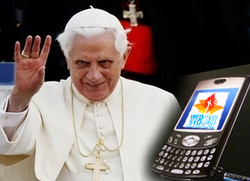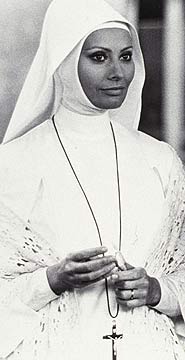By choosing the longtime Senate insider and foreign policy expert, Joe Biden, as his running mate, Barack Obama is also gambling that having a Catholic on the ticket will draw in some of the fence-sitting Catholics whose votes will be key to success in November. Peeling away a few evangelical votes, or hoping for a low turnout by the Christian right, is a prayer. As I wrote here, the white, suburban evangelicals who are the bedrock of the GOP election strategy may respect Obama, at best. But he’s not a member of the tribe, despite his thoroughgoing Christian bona fides, and it seems nothing will convince them otherwise.
Biden, however, is a strong bet in that he could–and should–play well with many Catholics. From abortion to his working-class background, he represents a viewpoint and a culture that resonate with the broad middle of Catholic opinion that finds the assertions of authoritative political opinion from right and left in the church highly dubious.
Consider Biden’s abortion record, as set out here and here. Biden supports Roe v. Wade but backed a federal ban on late-term abortions and opposes public funding of abortion. His record is mixed, which was enough to earn him a NARAL rating (currently at 60 percent) as low as 39 percent in recent years–and NARAL pointedly has not endorsed Biden.
Moreover, Biden’s compelling personal history–from his hardscrabble upbringing in a Catholic family (he breifly considered becoming a priest, as many Catholic boys of that era did) to the tragedy that claimed his wife and daughter, as well as his own near-death experience–have given him a broad perspective on life and a passionate commitment to fighting injustice. Much of his views, in fact, are grounded in Catholic social justice principles, which Obama seems to share intuitively. But Biden can speak to them much more cogently–and perhaps make up for his penchant for shooting from the lip.
A primary source would be this 2007 Christian Science Monitor profile, “A Frank and Abiding Faith,” as well as this Pew biography and David Brooks’ column from this week, “Hoping it’s Biden.”
Will the choice convince any of the knee-jerkers in the McCain camp? Of course not. For too many–on both aides–ideology and party loyalty trump deliberation and introspection, especially at this point in the campaign. You can already see the silly ads and dumb commentary all over the Web. Will the selection tip the “average voter”? Not so much. A Washington Post poll shows that three-quarters of voters said picking Biden would not sway their votes one way or the other. And about as many said they would be more apt to support Obama with Biden on the ticket as said the choice would make them less likely to vote Democratic on Election Day (13 to 10 percent).
But Biden’s Catholic, working-class roots, especially in a key region like Scranton in a “keystone” state like Pennsylvania could play well not just there, but in other similar regions in other battleground states, as well as with Catholics as a whole–the true swing vote.
The risky part of Obama’s gamble on Biden is that by picking a Catholic–and it wouldn’t matter who–he risks reigniting the “wafer wars” (an unfortunately commonplace phrase which–this is an update of a previous version–I’ll refrain from promoting further on advice of good counsel) that divide the faithful even more than they are. Given Biden’s background and record, however, the Wafer Warriors will have to go some ways to dirty up Biden on the faith issue. As the Pew bio has it:
When the Diocese of Wilmington’s bishop, Michael Saltarelli, came under pressure in 2004 and 2005 to deny communion to Biden and other Catholic politicians who support abortion rights, the bishop refused, saying through a diocesan spokesman that he “prefers prayer and active engagement” with politicians who take positions contrary to church doctrine; Biden refused to comment on the issue. Once again running for president, Biden said in April 2007 that his party must demonstrate it is “not afraid to deal with the faith issue.”
On the other hand, Saltarelli’s replacement, Bishop W. Francis Malooly, takes office on Sept 8, and his approach to Biden is unknown. Would he want to start his own term by courting such controversy? Most bishops–and Malooly is considered a deliberate fellow–would want to get to know one of their flock before making any drastic public moves, and that may be tough given Biden’s coming campaign agenda.
Still, it’ll be telling to see what blasts come at Biden from the usual Catholic suspects–and whether they will backfire in a way that would earn Obama-Biden more support than the ticket would have otherwise.

